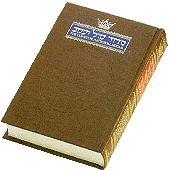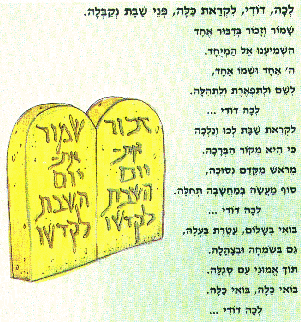

 The Friday evening prayers, the Kabbalat Shabbat and Arvit prayers, have a long historical background. In ancient times, there were no public services. Rather, individuals said the regular prayer and added:
The Friday evening prayers, the Kabbalat Shabbat and Arvit prayers, have a long historical background. In ancient times, there were no public services. Rather, individuals said the regular prayer and added:
 In the time of Hillel Hazaken, in year 20 B.C.E., the regular Amida prayer was changed. The twelve middle blessings were deleted and replaced by one single blessing relating to Shabbat. What remained was an Amida prayer containing the firt three bessings, the last three blessings, and a middle one relating to Shabbat. Thus, instead of calling it Shmone Esrei, eighteen blessings (which are really nineteen), the Shabbat Amida is called TEFILAT SHEVA.
In the time of Hillel Hazaken, in year 20 B.C.E., the regular Amida prayer was changed. The twelve middle blessings were deleted and replaced by one single blessing relating to Shabbat. What remained was an Amida prayer containing the firt three bessings, the last three blessings, and a middle one relating to Shabbat. Thus, instead of calling it Shmone Esrei, eighteen blessings (which are really nineteen), the Shabbat Amida is called TEFILAT SHEVA.
In the times of the Amoraim, the verses of Vayechulu were added after the Amida. The Gemara emphasises the importance of saying Vayechulu (Shabbat 119). In a later period, they added the six psalms from Tehilim and Lecha Dodi.
 The six psalms deal with the work of creation. After reciting these six chapters we sing: "Lecha Dodi Likrat Kalla - Come my beloved to greet the Bride, let us welcome the Shabbat." Rabbi Shlomo Alkabets composed Lecha Dodi. He lived in Tsefat in the sixteenth century. While the six psalms ushering the Shabbat symbolize the six days of the week, the seventh prayer, Lecha Dodi, symbolizes the seventh day, the Shabbat itself.
The six psalms deal with the work of creation. After reciting these six chapters we sing: "Lecha Dodi Likrat Kalla - Come my beloved to greet the Bride, let us welcome the Shabbat." Rabbi Shlomo Alkabets composed Lecha Dodi. He lived in Tsefat in the sixteenth century. While the six psalms ushering the Shabbat symbolize the six days of the week, the seventh prayer, Lecha Dodi, symbolizes the seventh day, the Shabbat itself.